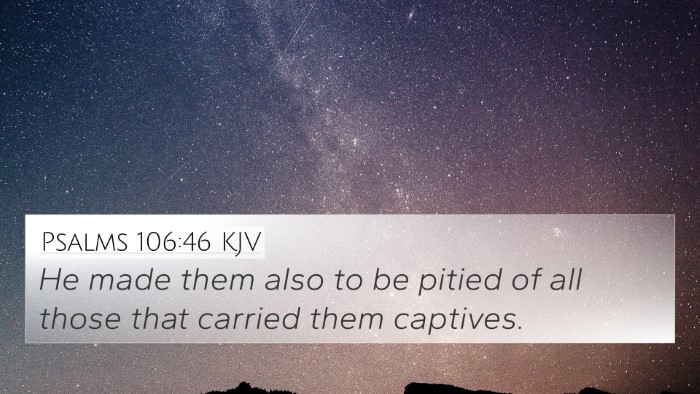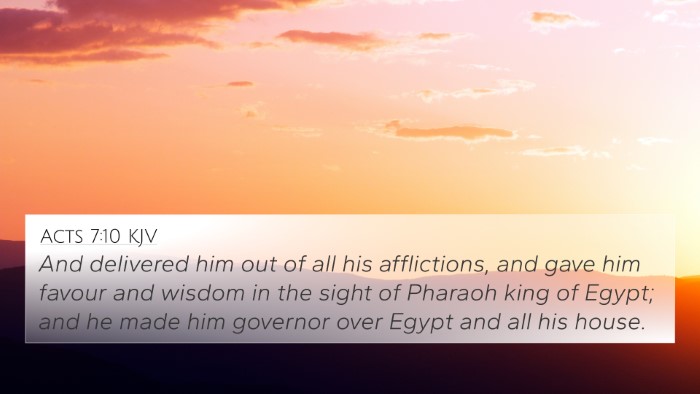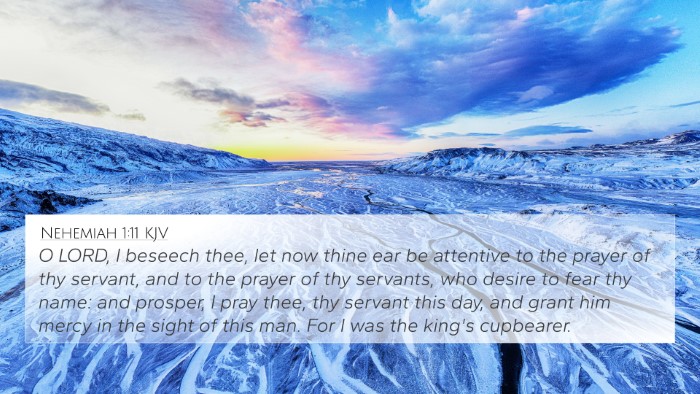Understanding 1 Kings 8:50
1 Kings 8:50 states: "And forgive thy people that have sinned against thee, and all their transgressions wherein they have transgressed against thee; and give them compassion before them who carried them captive, that they may have compassion on them."
Meaning and Insights
This verse appears during Solomon's dedication of the Temple in Jerusalem when he petitions God for mercy on behalf of His people. Matthew Henry, Albert Barnes, and Adam Clarke provide profound insights into the themes presented within this verse.
The Significance of Forgiveness
Matthew Henry emphasizes that the plea for forgiveness shows the recognition of Israel's habitual sinfulness and the steadfastness of God’s love and mercy. The act of asking for forgiveness is not mere formality but a desperate cry for divine intervention and restoration, displaying the humility of Solomon and the need for grace among God's people.
God's Compassion
Albert Barnes points out that the mention of compassion for the captors (those who took Israel into captivity) illustrates the broader theme of redemption and reconciliation. It highlights the transformative power of God's grace, where He can invoke compassion even in the hearts of their captors to show mercy towards the Israelites.
Theological Implications
Adam Clarke dives into the theological implications of sin and its dyad with forgiveness. He asserts that God's willingness to forgive denotes His eternal character as a merciful deity, consistently ready to pardon those who turn back to Him sincerely, emphasizing that restoration is central to God's interactions with humanity.
Cross-References Related to 1 Kings 8:50
- 2 Chronicles 7:14: Calls for humility and seeking God’s face for healing.
- Psalm 51:1-2: A plea for cleansing and forgiveness, linking to the theme of repentance.
- Isaiah 55:7: Urges the wicked to forsake their ways and return to the Lord for mercy.
- Luke 6:36: Encourages believers to be merciful, reflecting God’s mercy.
- Ephesians 4:32: Urges Christians to forgive one another just as Christ forgave them.
- James 5:15: Discusses prayer and healing in the context of sin and forgiveness.
- Matthew 6:12: The Lord’s Prayer includes a request for forgiveness, establishing its core importance in prayer.
- 1 John 1:9: Confession leads to forgiveness, further solidifying the promise of cleansing.
- Romans 12:19: Speaks on God’s role in vengeance, suggesting that mercy should govern our responses toward others.
- Micah 7:18-19: Highlights God’s compassion and forgiveness, emphasizing His readiness to pardon.
Inter-Biblical Dialogue: Connecting Themes
The verse serves as a part of a larger dialogue throughout the Bible addressing themes of sin, forgiveness, and divine compassion. The connections made through cross-referencing Biblical texts establish a framework for understanding God's character and our responses. Such themes of repentance and restoration span across books from the Old Testament to the New Testament:
- Old Testament emphasis on community repentance and forgiveness (e.g., Joel 2:12-13).
- New Testament teachings on individual and communal acting towards forgiveness (e.g., Matthew 18:21-22).
Tools for Bible Cross-Referencing
Utilizing Bible concordances, Bible cross-reference guides, and cross-reference Bible study methods enhances our study of scripture. Understanding Bible verse cross-references allows believers to see the links between scriptures and encourages deeper insight into how themes are interconnected:
- Engaging with a comprehensive Bible cross-reference materials can aid in finding related verses that strengthen interpretations.
- Utilizing Bible chains can help trace themes across the sacred text effectively.
- Tools designed for cross-referencing Bible study enable a systematic approach for detailed explorations of scripture.
FAQs on 1 Kings 8:50
Q: How does 1 Kings 8:50 relate to the New Testament?
A: This verse foreshadows the call for forgiveness exemplified through Christ's ministry, indicating that God's nature is constant in seeking reconciliation.
Q: What can I learn from the cross-references mentioned?
A: Cross-references reveal underlying themes of mercy and forgiveness throughout scripture, allowing for a broader understanding of God's redemptive plan.
Q: How can I find cross-references for other verses?
A: Use tools like a Bible concordance or online Bible reference resources to explore connections between different scriptures.
Conclusion
1 Kings 8:50 is a powerful assertion of dependence on God's mercy and compassion, encapsulating essential themes of forgiveness woven throughout scripture. By examining the cross-references and utilizing tools for Bible cross-referencing, one can gain a deeper comprehension of the interconnectedness of biblical messages.











